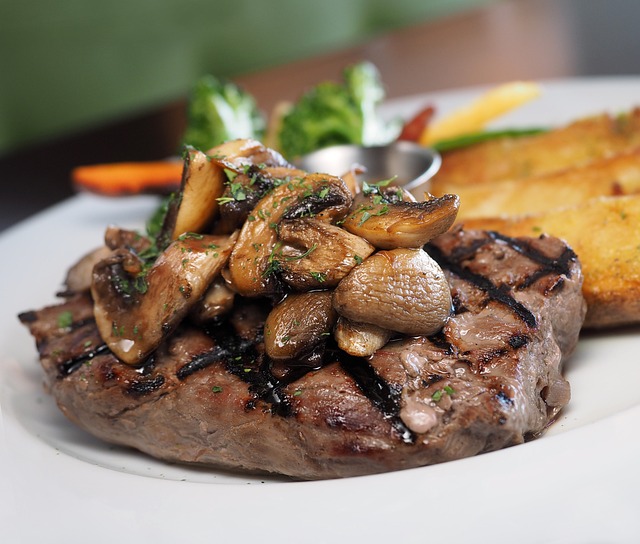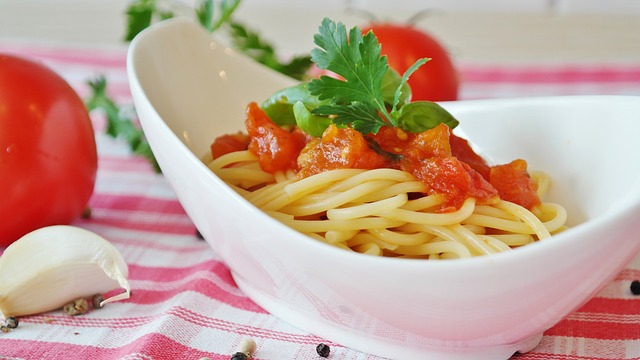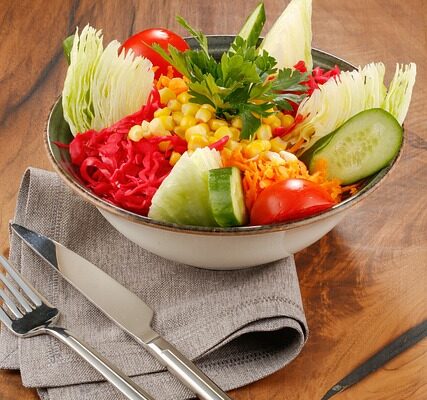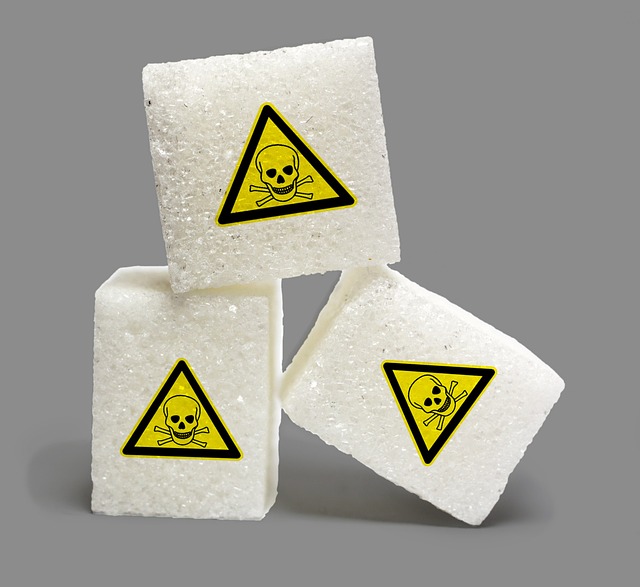Here is the rest of the 7-day meal menu.
Day 4
- Breakfast: smoothie (Blended with ice, 1/2 cup of soft tofu, 1 small banana, 1/2 cup of blueberries, 1/2 cup of sliced strawberries, and 1 teaspoon of peanut butter), 1 hard-cooked egg
- Macronutrients: 370 calories, 22 grams of protein, 15 grams of fat, and 43 grams of carbs.
- Snack: 1/2 turkey sandwich (one slice of whole wheat bread, 1 1/2 ounces of deli turkey, tomato, lettuce, and 1 teaspoon of honey mustard) with one small orange.
- Macronutrients: 207 calories, 11 grams of protein, 5 grams of fat, and 32 grams of carbs.
- Lunch: A tuna wrap (3 ounces of can water-packed albacore tuna, 1/2 stalk celery, 2 tablespoons of minced red onion, 1/4 cup of nonfat plain Greek yogurt, one 6-inch 100% whole-wheat tortilla), and 20 grapes.
- Macronutrients: 453 calories, 48 grams protein, 43 grams carbs, and 9 grams fat
- Snack: 1 ounce of toasted unsalted almonds (22 kernels) and 1/4 cup of mixed dried fruit, unsweetened (raisins, chopped figs, dried apples)
- Macronutrients: 187 calories, 4 grams protein, 32 grams carbs, and 7 grams fat
- Dinner : 3 oz. of grilled sirloin steak, 1 medium baked potato with chives, and 2 teaspoons of nonfat Greek yogurt along with 1 cup sautéed sliced mushrooms in 1 tablespoon of olive oil
- Macronutrients: 555 calories, 33 grams of protein, 48 grams of carbs, and 27 grams of fat
- Snack: 1 ounce (70% cocoa) of dark chocolate
- Macronutrients: 170 calories, 2 grams of protein, 12 grams of fat, and 13 grams of carbs.
- Total Daily Intake: Around 1,942 calories, 120 grams of protein, 212 grams of carbs, and 75 grams of fat

Day 5
- Breakfast: sandwich (one scrambled egg, one toasted 100% whole-wheat English muffin, 1-ounce low-fat cheddar cheese, 1 teaspoon dijon mustard) with 2 tangerines
- Macronutrients: 391 calories, 21 grams of protein, 13 grams of fat, and 51 grams of carbs
- Snack: 6-ounce package of plain nonfat Greek yogurt, 1 large banana, and 10 unsalted almonds.
- Macronutrients: 269 calories, 17 grams protein, 37 grams carbs, and 7 grams fat
- Lunch: Vegetarian Southwest Quinoa Salad (3 cups of mixed greens, 1/2 cup of sliced cucumbers, 1/2 cup of sliced green and red peppers, 1/4 cup of shredded carrots, 2 tablespoons of unsalted sunflower seeds, and 2 tablespoons of apple cider vinaigrette dressing)
- Macronutrients: 487 calories, 15 grams of protein, 55 grams of carbs, and 26 grams of fat
- Snack: a 1/4 cup of hummus, half a cup of carrot sticks, and half a cup of celery sticks, along with 4 crackers made of whole grains.
- Macronutrients: 216 calories, 8 grams protein, 30 grams carbs, and 9 grams fat
- Dinner: Fish tacos (4 ounces of cooked white fish, shredded red cabbage, julienned jicama, tomato salsa, red onions, freshly squeezed lime, and 2 small (4-inch) corn tortillas) and 1 grilled ear of corn on the cob
- Macronutrients: 393 calories, 33 grams protein, 53 grams carbs, and 6 grams fat
- Snack: 1 large apple with 1 tbsp of peanut butter
- Macronutrients: 189 calories, 29 grams of carbs, 8 grams of fats, and 4 grams of protein
- Total Daily Intake: About 1,945 calories, 102 grams of protein, 255 grams of carbs, and 69 grams
Day 6
- Breakfast: Overnight fruit and nut oats (1/2 cup rolled oats, 1 cup nonfat milk, 2 tbsp of raisins, 1 tbsp chia seeds, 4 chopped walnut halves with a dash of cinnamon)
- Macronutrients: 392 calories, 17 grams of protein, 12 grams of fat, and 58 grams of carbs.
- Snack: 1/4 quarter mashed avocado placed on one slice Bread made entirely of whole wheat with twenty grapes
- Macronutrients: 229 calories, 6 grams protein, 36 grams carbs, and 9 grams fat
- Lunch: One serving of chicken noodle soup, 3 cups of mixed greens tossed with 2 tablespoons balsamic vinaigrette dressing, 4 grape tomatoes, 1/4 of grated carrots, 1 medium slice of red onion, 1/2 cup of cucumbers, alfalfa sprouts, 1/2-ounce shredded low-fat cheddar cheese
- Macronutrients: 456 calories, 21 grams of protein, 54 grams of carbs, and 17 grams of fat.
- Snack: 1 cup of ready-to-eat 100% whole-wheat cereal, unsweetened 1/2 cup of skim milk
- Macronutrients: 105 calories, 7 grams protein, 27 grams carbs, and 3 grams fat
- Dinner: 4 ounces chicken cutlet (2 teaspoons 100% whole wheat bread crumbs, 1 oz of shredded low-fat mozzarella cheese, and 2 tablespoons marinara sauce), 1 cup whole-wheat spaghetti, 2 tablespoons marinara sauce, and parmesan cheese with 1 cup of steamed broccoli
- Macronutrients: 561 calories, 39 grams protein, 57 grams carbs, and 22 grams fat.
- Snack: 1/2 cup of vanilla ice cream, 1/2 cup of strawberries, and 2 chopped walnuts
- Macronutrients: 190 calories, 3 grams protein, 23 grams carbs, and 10 grams fat
- Daily Total Intake: calories are around 1,935, with 94 grams of protein, 254 grams of carbohydrates, and 72 grams of fat.

Day 7
- Breakfast: Heated banana nut oats (1/2 cup steel cut oats in 1 cup nonfat milk with 1 tablespoon almond butter, topped with 1/2 medium banana slices)
- Macronutrients: 387 calories, 18 grams of protein, 12 grams of fats, and 56 grams of carbs
- Snack: 8 whole grain crackers and 1 ounce of reduced-fat cheddar cheese
- Macronutrients: 208 calories, 11 grams protein, 27 grams carbs, and 7 grams fat
- Lunch: Stir-fried Shrimp 3 oz. (sautéed peeled shrimp with 1/2 cup of red and green peppers, 1/2 cup of sliced onions, fresh ginger, 1 tablespoon of vegetable oil, and 1 teaspoon of low-sodium soy sauce) with 1 cup of cooked brown rice
- Macronutrients: 507 calories, 26 grams of protein, 63 grams of carbs, and 17 grams of fat
- Snack: 1/2 cup cottage cheese (low-fat), 1/2 cup canned pineapple, unsweetened that’s packed in its juice.
- Macronutrients: 160 calories, 14 grams protein, 21 grams carbs, and 3 grams fat
- Dinner: 1 serving of Mexican Chicken Verde Quinoa Casserole (1 tablespoon of cilantro lime vinaigrette dressing over 2 cups romaine lettuce, one sliced radish, 1/4 cup sliced jicama, and one slice tomato)
- Macronutrients: 514 calories, 40 grams protein, 43 grams carbs, and 19 grams fat.
- Snack: 1 small pear with 1 oz. of unsalted mixed nuts.
- Macronutrients: 169 calories, 3 grams protein, 26 grams carbs, and 8 grams fat
- Total Daily Intake: Around 1,986 calories, 112 grams of protein, 236 grams of carbs, and 66 grams of fat.
How to Design a Diabetes Diet Meal
Incorporate a wide range of nutrient-dense foods. Any diabetes meal plan should include a variety of nutrient-dense meals from all dietary groups, such as fruits, vegetables, whole grains, healthy proteins, and healthy fats.
Understand your carbohydrates. Carbohydrates are primarily found in fruits, grains, starchy vegetables (potatoes, peas), and dairy products such as milk and yogurt. Carbohydrates can be found in highly processed meals such as candies, cookies, and cakes.
Track carbohydrates using food labels. To track and count carbs, use the Nutrition Information label on packaged items. Alternatively, you might use a food-tracking app.
Attempt the plate method. Instead of counting carbs, you can use the plate approach to plan your meals. Half of your plate should have non-starchy veggies, 1/4 with a high-fiber carbohydrate, and 1/4 with a healthy protein for the plate technique. For instance, half your meal could be roasted broccoli and cauliflower, one-fourth of baked sweet potato, and the other quarter-roasted chicken breast. To keep servings in check, use a 9-inch plate.
Every day, eat the same amount of food at the same time. Consistency aids blood glucose management when following a diabetic diet plan. You don’t have to eat the same items every day, but eating around the same amount of food at roughly the same time helps maintain blood glucose levels stable. The type of diabetes medication you use may influence the flexibility of your food plan. Delaying or skipping a meal, or eating too much fiber with minimal carbohydrates, may cause blood glucose levels to drop too low when taking certain drugs.
Reduce your intake of foods heavy in added sugar, salt, and harmful fats (saturated and trans fat). Under a diabetic meal plan, no food is forbidden. Fried foods, foods with a lot of added sugar and salt, and sweets, on the other hand, should be avoided. 1 These foods are high in calories and carbs but low in nutrients.
To Conclude
A diabetic meal plan is an essential aspect of diabetes management. Unfortunately, no single strategy is suitable for everyone. When following a meal plan, the most important thing to remember is to incorporate a variety of nutrient-rich meals in the appropriate amounts.
Consult a healthcare physician or a qualified dietitian for assistance in creating a meal plan. They can assist you in creating a meal plan that is tailored to your preferences, budget, lifestyle, and goals.

